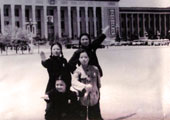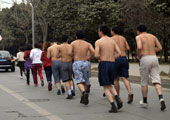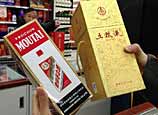
Shanghai bourse falls nearly 3%, biggest one-day drop in months
Stocks in the Chinese mainland fell on Thursday after the government said property price controls will remain, and after an apparent credit-tightening stance by the central bank.
The benchmark Shanghai Composite Index fell nearly 3 percent, or 71.23 points, to 2325.95, the biggest one-day fall in 15 months. Turnover was 126.63 billion yuan ($20.3 billion).
Other Asian markets also suffered a sell-off on Thursday following a tumble on Wall Street as traders grow concerned that the US Federal Reserve could bring an early end to its huge stimulus program.
Premier Wen Jiabao told a meeting of the State Council - China's cabinet - on Wednesday that property price controls will be maintained. His statement was believed to have been made in response to a price rebound in the real estate market in some cities.
Stock analysts said the council's declared position on curbing the property market was the "real and immediate reason" for Thursday's market sell-off.
Various other factors also played a role, they said, the major one being an announcement by the central bank on tightening liquidity by issuing up to 30 billion yuan of repurchase orders, or repos, to mop up excessive liquidity.
Before this, the People's Bank of China had not issued any standard repos since June.
The reintroduction of repos, especially the 10 billion yuan in longer-term 91-day repos issued on Thursday, led some analysts to conclude that the central bank has turned hawkish, according to Reuters.
"The reason is complex. The direct concern is about the authorities' curbs on the property industry, but it also has to do with uncertainty about the macroeconomic policy, and also concern that the Federal Reserve may scale back the US economic stimulus," said Li Jun, a special analyst with Sina Finance.
Hampered by the poor performance of shares in sectors including coal, nonferrous metals, oil, brokerages, mechanical and auto industry, almost all share prices dropped. Environmental protection and distillers were the only sectors to see gains.
The Shanghai index rose by 186.38 points, or 8.77 percent, in January, strongly boosting the confidence of both large-scale and small investors. Some analysts believed it signaled the return of a bull market. But the index has seen a three-day fall in the first four trading days since the seven-day Spring Festival holiday.
Tracking by the China Index Academy, a real estate research body, saw 21 of 27 monitored cities register sales of floor space more than five times the area recorded in the corresponding holiday week last year and at higher prices.
On the other hand, investors are sensitive about liquidity drain.
"The central bank will try to tighten liquidity this year to counter rises in home prices, and also to curb inflationary pressures at the consumer level," said Dariusz Kowalczyk, a Hong Kong-based strategist at Credit Agricole CIB.
















 At 75, he travelled in Europe; at 98, he got a master's degree; at 102, he published an autobiography.
At 75, he travelled in Europe; at 98, he got a master's degree; at 102, he published an autobiography.


![]()
